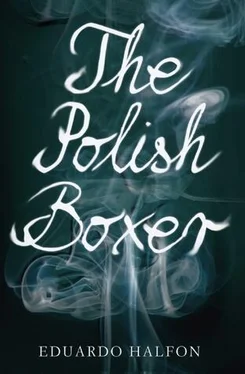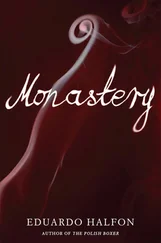Eduardo Halfon - The Polish Boxer
Здесь есть возможность читать онлайн «Eduardo Halfon - The Polish Boxer» весь текст электронной книги совершенно бесплатно (целиком полную версию без сокращений). В некоторых случаях можно слушать аудио, скачать через торрент в формате fb2 и присутствует краткое содержание. Год выпуска: 2012, Издательство: Bellevue Literary Press, Жанр: Современная проза, на английском языке. Описание произведения, (предисловие) а так же отзывы посетителей доступны на портале библиотеки ЛибКат.
- Название:The Polish Boxer
- Автор:
- Издательство:Bellevue Literary Press
- Жанр:
- Год:2012
- ISBN:нет данных
- Рейтинг книги:4 / 5. Голосов: 1
-
Избранное:Добавить в избранное
- Отзывы:
-
Ваша оценка:
- 80
- 1
- 2
- 3
- 4
- 5
The Polish Boxer: краткое содержание, описание и аннотация
Предлагаем к чтению аннотацию, описание, краткое содержание или предисловие (зависит от того, что написал сам автор книги «The Polish Boxer»). Если вы не нашли необходимую информацию о книге — напишите в комментариях, мы постараемся отыскать её.
marks the debut of a major new Latin American voice in English.
The Polish Boxer — читать онлайн бесплатно полную книгу (весь текст) целиком
Ниже представлен текст книги, разбитый по страницам. Система сохранения места последней прочитанной страницы, позволяет с удобством читать онлайн бесплатно книгу «The Polish Boxer», без необходимости каждый раз заново искать на чём Вы остановились. Поставьте закладку, и сможете в любой момент перейти на страницу, на которой закончили чтение.
Интервал:
Закладка:
I didn’t say anything. I didn’t have an answer. I still don’t. I still don’t know why I wanted to find Milan Rakić. Nor am I altogether sure when or how I decided to travel to Belgrade.
Perhaps the idea began to germinate in my mind because of all those postcards, through all those stories that I somehow began to think of as my own. And perhaps it continued to incubate during the whole year I hadn’t received any news at all from Milan. And perhaps it ended up taking its obsession-like shape when I came across the perfect little bow for my Balkan parcel by the name of Danica Kovasević, a very beautiful, very Serbian girl who had been living in Guatemala for more than a decade.
I met her at a trendy nightclub. Before introducing me to her, a friend whispered to me that although she claimed to work as a publicist, she was actually a very high-class prostitute. One of those really top-end ones, compadre, he said with a smell of artificial tequila on his breath, staring out at some distant mountaintop kingdom. That night, in the midst of all the commotion and the noise of some kind of electronic music, I told Danica (stressed on the middle syllable, not the first, she said, correcting me) that I wanted to travel to Belgrade, though it’s also quite likely that after two or three whiskies I actually told her that I needed to travel to Belgrade, since whiskey, as we all know, as my Polish grandfather knew particularly well, tends to sharpen the notes of necessity. She smiled and said oh, right, evidently skeptical. But the following day, I phoned her and told her again that I wanted to take advantage of an invitation to Póvoa de Varzim, in Portugal, to travel to Belgrade and that I also wanted her help in getting my bearings and perhaps finding somewhere to stay. I’ve even bought my plane ticket, I told her, lying. Danica said to give her a couple of days, that she’d call me back. She called two weeks later. All set, she said. A friend of mine, Slavko Nikolić, will pick you up at the airport, and he’ll take you himself to an apartment on Nedeljka Cabrinovića, and I immediately pictured a dirty, dark little room used as a base for underage whores and human trafficking. I said nothing, just weighing up my stupidity. It’s very cheap, she said, don’t worry. Slavko’s a good guy, she added. In the background I heard a rough male voice saying something or asking for something, and Danica hung up without saying goodbye. Giving plenty of notice, then, I informed the university that I was going to be taking two weeks’ vacation, accepted the invitation to Portugal entirely as a pretext (I wrote my “Speech at Póvoa” a few days prior to leaving, after an endless night of Bergman and insomnia), and without giving any of it too much thought I bought myself a complicated plane ticket that included a stay in Belgrade. Simple as that. Irrational as that.
But I nearly didn’t go. Ten days before the trip, I got in touch with the Serbian embassy in Mexico (there isn’t one in Guatemala) in order to obtain a tourist visa. Right away, they sent me a checklist of requirements, a pretty ridiculous and pretty long checklist that included, besides photocopies of bank statements and a record of my credit history, a letter from the person in Belgrade who was inviting me, signed and authenticated by a notary. We need the original letter, a girl from the embassy told me over the phone. Sorry, no scans, do you understand? she insisted in a thick accent and a paranoid tone of voice, but I thought I’d heard her say: Sorry, no can do, you understand? I immediately called Danica and she said to send Slavko Nikolić an e-mail explaining the situation. A few days later, he replied in ratlike Spanish to say he was sorry but that it would be impossible to procure the letter — that was the word he used, procure — and I imagined an endless line of Serbs trying to get their hands on a bit of hard bread and tinned sardines and, with any luck, a roll of toilet paper. He said that he was very sorry, but the previous week he’d slipped on a patch of ice and was now in bed with a broken leg. Just about ready to toss my ticket in the trash (in a manner of speaking), I sent another e-mail to the embassy in Mexico, explaining the situation to them, and the following day they replied that I needn’t worry about the letter, that it wasn’t a problem, that they’d make an exception in my case. That they’d what? An exception? Sometime later, I learned that the Serbian ambassador in Mexico was Mrs. Vesna Pesić, who had been a political activist at the time of the fall of Milošević, and was the wife of an American economist who, mysteriously, fortuitously, was also a professor and a colleague of mine from the university in Guatemala. I never found out for sure whether that had anything to do with the sudden and merciful waiving of the visa, but three days before leaving I already had my passport back with a firmly stuck-on Serbian decal, which said, in ancient-looking typed letters, Turisticki.
Why do you want to find him, Dudú? Lía had asked me again, now out of her little doctor’s outfit, while she was putting all the postcards — along with the photo of a very serious-looking Milan Rakić that we’d cut out of a Guatemalan newspaper — into an old yellow envelope.
I never answered her. I don’t know whether one single answer existed. I don’t think so. There’s always more than one truth to everything, Milan had written in one of his postcards. The why of an action is a kind of intellectual crossword, it occurred to me then or it occurs to me now, in which you try to fill in the little empty boxes that get tangled up with one another, that mix and lean into one another, in which no one answer is worth more or less than any other and also where each answer might on its own seem irrational or even downright crazy. But when they are brought together, they complement and strengthen one another. Or something like that. I felt seduced, I guess, seduced by his music, seduced by his postcards, seduced by his story, seduced by the revolutionary tremors of his spirit, seduced by a smoky, erotic image that I wouldn’t be able to make out clearly until the very end of my stay in Belgrade. And a man seduced doesn’t measure anything the same way, not time, not the force of gravity, and especially not distances. The only thing I understood, really understood, was that I was obsessed with the idea of looking for him, that I needed to look for him perhaps in the same way that a curious, morbid, slightly fearful child needs to look under the bed for ghosts.
The Pirouette
Like I was drugged right there in Barajas airport, like I was floating in a dream dreamed by someone else who was surprised to see me but also found it pitiable and let me just carry on floating, I took a Swissair flight from Madrid to Belgrade.
I prefer a window seat, but I got the aisle. Two kids of about nine or ten sat down next to me. Little brothers expatriated during the war, I thought, now going back to visit their uncles and cousins and grandparents. Both of them were nervous. I tried to say something to them in French, but I don’t think they understood me at all; I just made them more nervous. On the other side of me, across the aisle, a beautiful girl of about seventeen sat down. Slim and blond, her fingernails painted scarlet, she wore huge dark glasses with white plastic frames that looked like they were left over from the seventies. She took off her shoes and socks. Her feet were dirty. Suddenly, one of the kids next to me started crying and his brother scuttled off to tell the flight attendant. I tried to offer him a stick of gum, but he just hugged tighter his purple elephant. He told the flight attendant he had a stomachache and the flight attendant brought him a room-temperature Coke. His little brother knelt on the floor and, using the seat as a table, started drawing soccer players in a huge notebook. The blond girl said something to me in Serbian or maybe Russian — I don’t know — that sounded like the swishing of a bunch of magnolias, which is, of course, pretty implausible, given I’ve never heard the swishing of a bunch of magnolias. I smiled the forced smile of an idiot.
Читать дальшеИнтервал:
Закладка:
Похожие книги на «The Polish Boxer»
Представляем Вашему вниманию похожие книги на «The Polish Boxer» списком для выбора. Мы отобрали схожую по названию и смыслу литературу в надежде предоставить читателям больше вариантов отыскать новые, интересные, ещё непрочитанные произведения.
Обсуждение, отзывы о книге «The Polish Boxer» и просто собственные мнения читателей. Оставьте ваши комментарии, напишите, что Вы думаете о произведении, его смысле или главных героях. Укажите что конкретно понравилось, а что нет, и почему Вы так считаете.












